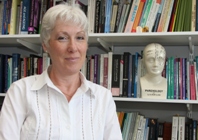Psychological effects of cancer

Dr Kate Bullen
25 October 2012
Research at Aberystwyth University into the psychological effects of penile cancer on masculinity has been used in the development of a new website launched this week at the Royal Society in London.
The award-winning experiential website Healthtalkonline, (www.healthtalkonline.org) features a new section on the rarely discussed topic of penile cancer, of which 400-600 new cases are diagnosed in the UK each year.
The work at Aberystwyth University has been led by Dr Kate Bullen, Head of the Department of Psychology, Institute of Human Sciences.
Dr Bullen has been part of a research group, funded by a National Institute of Health Research (NIHR) Research for Patient Benefit grant, investigating the experiences of men following surgery for penile cancer.
The research group has been led by Dr Peter Branney from Leeds Metropolitan University who has worked with Aberystwyth and Oxford Universities and St James Hospital Leeds to develop the project.
Dr Bullen has been working with colleagues in Morriston Hospital, Swansea on the psychology of male urogenital cancers for the last 8 years. Research from an early penile cancer study was presented in Leeds in 2008 and the current project was heavily influenced by the original pilot data.
The Psychology Department at Aberystwyth University has several members of staff with an interest in health related gender issues and a recently completed PhD investigated the affect of penile cancer on masculinity.
Over 70 men from Wales and England participated in the study which was funded by an Aberystwyth University doctoral studentship with the support of charitable donations from Welsh Freemasons.
Dr Bullen said: “The launch of the penile cancer section on the Healthtalkonline website is an important outcome of the work we have been contributing to in this difficult area.
“Cancer is a challenging experience at any time but particularly so when the cancer is unusual, exactly the case with penile cancer.
“Men who have the disease often say they would like to hear about other people’s experiences as this helps to reduce feelings of isolation, however, this is problematic if there are few patients with the condition.
“In a rural environment such as ours access to someone to talk to is particularly difficult, visitors to the site will be able to watch men talking about their experiences and how they have dealt with a penile cancer diagnosis and treatment.
“Having a website also helps to overcome the feelings of embarrassment men can have about being diagnosed with cancer in such an intimate area.
“We know from our research in Aberystwyth that men can find it difficult to talk about their feelings and so a website such as this is extremely useful as it enables men to feel more in control and less vulnerable at a difficult time of their lives.”
Primary treatment for penile cancer is surgery, which is often quick and pain free with regular follow ups to check the patient’s progress. The aim is to surgically remove the cancer and any lymph nodes that are affected.
The larger the cancer, the greater the amount of penile tissue that needs removing, with resulting implications for sexual activity and using the lavatory. Early diagnosis is extremely important as it can affect the type of surgery and the amount of penile tissue that has to be removed. Nevertheless, the surgery is technically uncomplicated, most men quickly recover good physical health and the chances of cure are high.
Dr Peter Branney, Senior Lecturer in Social Psychology at Leeds Metropolitan University says: “A lot of men have never heard of penile cancer and some are shocked to discover that cancer can develop on the penis. The UK is world leading in the treatment of penile cancer, yet our research shows the symptoms are regularly mistaken for a sexually transmitted disease, which delays treatment.
“If we talk about penile cancer more widely, then men might be diagnosed faster and be better equipped to cope with both the physical and emotional impact of the condition,” he added.
AU35312



